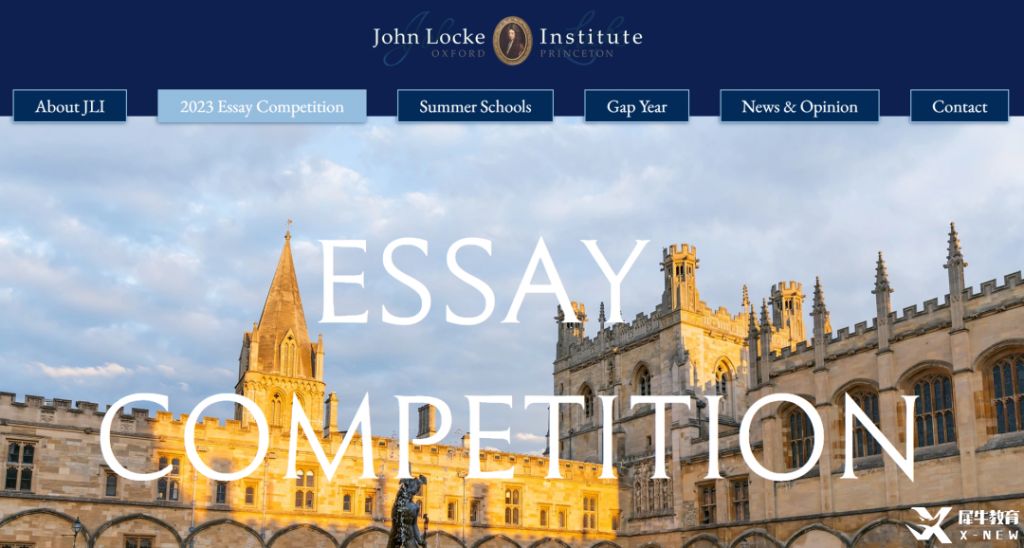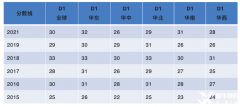发布时间:2024-02-01 14:15:17 编辑:小妹来源:网络
John Locke约翰·洛克论文竞赛是由牛津大学、普林斯顿大学的顶级学者发起并且评审的国际论文竞赛,对于未来要走人文社科方向的同学来说,入围John Locke论文比赛,就等于学术研究和思维逻辑能力都得到了官方认可!让我们一起来看看吧!
John Locke论文竞赛

John Locke写作竞赛是由位于牛津的独立教育组织John Locke Institute与英国牛津大学、美国普林斯顿大学等优质院校教授合作组织的学术项目,其评审全部来自英国牛津大学,每年举办一次。选题涵盖了哲学、政治、经济、历史、心理学、神学、法律七个学科,每个学科设置不同的问题,从极富趣味性和挑战力的写作题目出发,旨在培养参赛者的议论文写作能力,考察参赛者对于不同学科领域独立深刻的见解、广博的认知、清晰的说理能力、批判性地分析思维能力和说服力。
因其学科范围广、选题深刻有趣,已成为全世界非常受欢迎和认可的高中生英文论文竞赛之一。
参赛对象
高年级组:提交论文时年满18岁及以下
低年级组:提交论文时年满14岁及以下
比赛方式
官网一般会在2月份公布7个主题的题目。学生根据自己的兴趣选择一个问题写一篇论文,在截止日期前(一般是6月底)提交。
每篇文章只能在所选主题类别中回答一个问题,可以提交多篇文章,但不得超过2000字(不包括图表、数据表、脚注、参考书目或作者声明)。
奖项设置
Grand Prize (终极奖):
1人,获得John Locke学院10,000美元的荣誉奖学金,用于参加学院一个或多个暑期学校或gap year课程。
各学科领域:
Winner、Second Prize、Third Prize各1人:获得2000美元奖学金,用于覆盖John Locke学院任何课程的费用。
High Commendations:
除去以上获奖的其他优秀文章,最佳论文的作者们将获得表彰并入围奖品获得者的列表中。入围的作者们还将被邀请到牛津参加9月份的学术会议和颁奖晚宴。
历年入围情况
|
年份 |
投稿数 |
入围数 |
|
2022 |
6805 |
1300 |
|
2021 |
4000 |
915 |
|
2020 |
2740 |
710 |
John Locke论文竞赛是人文社科方向的同学必参加的比赛之一,主要有以下2个原因:
助力名校申请
John Locke约翰·洛克论文竞赛的评审都来自牛津大学,每年的话题都和时事息息相关,可以说是大学录取的风向标。每年都吸引全球数千名擅长思考和写作的中学生参加。往年参赛的学生录取院校包括普林斯顿、哈佛、耶鲁、斯坦福、芝加哥、伯克利、牛津、剑桥等世界名校。
提升学术写作能力
对于人文社科方向的同学来说,学术写作的能力是必不可少的。参加John Locke论文竞赛,不仅是为了获得奖项,也可以在备赛的过程中提升自己的写作能力、逻辑思维。为今后的大学生活做好准备。
如何备赛John Locke论文比赛
John Locke论文竞赛对参赛者的学术要求很高,同学们至少要具备以下能力:
了解哲学,政治,经济,历史,心理学,神学或法律等学科领域的基本知识结构。
掌握议论文的基本写作格式和技巧。
在文章中展现独立的思想,清晰的逻辑和辩证的分析方式。
不同于普通的英文写作,John Locke论文写作有着严格的审核要求。想要写出一篇符合参赛要求的学术论文,至少要经过以下几个步骤:
熟悉学术论文写作格式
选取同学们感兴趣的话题
进行相关领域的广泛阅读
储备所需要的相关话题的专业知识
开始破题、梳理大纲
进一步资料搜索
仔细斟酌,修改大纲
着手写作段落细节
反复修改、校对全文
在这里列出了2023年John Locke官方公布的7大主题的问题,同学们可以作为参考。
(向下滑动查看)
备赛建议:
1️⃣从论证格式上来看,John Locke论文比赛的要求和国际学校的Argumentative Essay更相似。建议同学们精读历年的获奖论文,学习并拆解它们的结构,
2️⃣在动笔前,同学们可能需要花1-2个月的时间去做知识储备的工作,累计在相关领域内的理论、知名学者的著作和观点,并且分析他们不同点在哪里,每一个主要的核心观点里面再去细分更多分论点。
3️⃣在写作时,同学们要敢于清晰的表达自己的观点。明确作者的写作目的,预设对读者的影响,不要拐弯抹角和跑题。
4️⃣在提交时,一定要按照官网规定的日期节点和标准格式提交,文件名一律按照Alexander-Popham-Psychology-2.pdf的格式。

AMC04-17


物理碗04-23

物理碗06-05


化学竞赛01-11